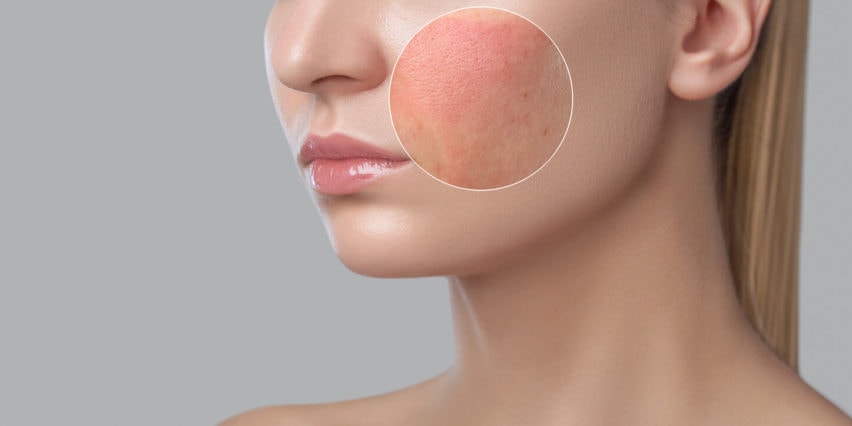Skin inflammation, also known as dermatitis, is a general term to describe skin irritation or swelling. This can range from mild redness and itching to severe rashes, blisters, and pain. According to the National Eczema Society, one in ten adults in the UK suffers from eczema, while psoriasis affects two in 100 people between the age of 20 and 60.
Skin conditions can significantly impact a person’s quality of life, causing discomfort and pain. A dermatologist can diagnose the specific type of skin irritation a person experiences by considering the symptoms, skin appearance, and other relevant factors like family history.
What are the causes of skin inflammation?
There are many causes of skin inflammation, ranging from external triggers like irritants and allergens to internal factors such as underlying medical conditions.
Here is a complete breakdown of the causes of skin inflammation:
1. Irritants
Irritants can cause skin inflammation by damaging the skin’s natural barrier and triggering an immune response. The skin is a barrier to protect the body from harmful substances and environmental factors. However, the skin can become irritated and inflamed when it comes into contact with certain irritants.
Irritants can cause skin inflammation in several ways, including:
- Direct chemical damage: Some irritants, such as strong acids and bases, can directly damage the skin cells and cause inflammation.
- Allergic reaction: Some individuals may develop an allergic reaction to certain irritants, which can cause skin inflammation and itching.
- Irritant contact dermatitis: This type of skin irritation is caused by repeated or prolonged exposure to irritants, such as soaps, detergents, or solvents. Over time, the skin becomes sensitised to these irritants and reacts with redness, itching, and swelling.
In case of irritant exposure, wash the affected area with soap and water as soon as possible and seek medical advice if necessary.
2. Allergens
Allergens can cause skin inflammation by triggering an allergic reaction in individuals sensitised to certain substances. Allergic reactions occur when the immune system overreacts to a normally harmless substance and releases chemicals, such as histamine, into the body that causes inflammation, itching, swelling, and other symptoms.
Common allergens that can cause skin inflammation include:
- Certain foods: Some individuals may develop a skin reaction after eating specific foods such as nuts, shellfish, and strawberries.
- Medications: Some people can develop skin reactions after using penicillin or aspirin.
- Metal allergens: Certain metals, such as nickel, can cause skin irritation in some individuals.
- Latex: Some people are prone to developing a skin reaction after coming into contact with latex found in gloves and condoms.
- Cosmetics: Some individuals may develop a skin reaction after using cosmetics such as perfumes or hair dyes.
It is crucial to identify and avoid known allergens to minimise the risk of skin inflammation. In case of an allergic reaction, seek medical advice and treatment.
3. Autoimmune conditions
In autoimmune skin conditions, the immune system mistakenly identifies normal skin cells as foreign invaders and launches an attack against them, leading to skin inflammation and other symptoms.
Some common autoimmune skin conditions that can cause skin irritation include:
- Psoriasis is characterised by red, scaly patches of skin caused by an overproduction of skin cells.
- Systemic lupus erythematosus (SLE) is a type of lupus that can affect the skin, causing rashes, sores, and other symptoms.
- Dermatomyositis causes a rash on the face, neck, and other areas and muscle weakness.
- Pemphigoid is characterised by blisters and sores on the skin and mucous membranes.
In autoimmune skin conditions, working closely with a healthcare professional to develop an individualised treatment plan to manage skin inflammation is vital.

4. Inflammatory skin conditions
Inflammatory skin conditions are a group of skin disorders that cause skin inflammation due to an overactive immune response. Some common inflammatory skin conditions include:
- Eczema: Also known as atopic dermatitis, eczema is characterised by dry, itchy, and red skin. A combination of genetic and environmental factors, like dry skin, irritants, and allergens, may cause it.
- Acne: This condition is caused by a buildup of oil and dead skin cells in the hair follicles, leading to clogged pores and pimples. Inflammation can occur due to an overproduction of oil and bacteria on the skin.
- Rosacea: This condition causes redness and flushing on the face, as well as pimples and visible blood vessels. The exact cause of rosacea is unknown, but it is believed to be related to a combination of genetic and environmental factors.
- Contact dermatitis: This condition is caused by direct contact with irritants or allergens, such as soaps, detergents, or cosmetics. Inflammation occurs as a result of an immune response to the substance.
- Psoriasis: This condition is characterised by red, scaly patches of skin caused by an overproduction of skin cells. It may be triggered by stress, infection, or injury to the skin.
Treatment for inflammatory skin conditions may involve medications to reduce inflammation and relieve itching and swelling, as well as changes to skincare and lifestyle habits to minimise triggers and manage symptoms.
Book Appointment
All treatments are carried out by our team of doctors at our London Botox clinic. Appointments can be booked online, via email or by calling our Soho clinic on 020 7851 6624 during opening hours. We are located a few minutes walk away from Carnaby Street.
Call our clinic team if you have any questions
View our prices
Or email us
5. Infections
Infections can cause skin inflammation by introducing harmful microorganisms, such as bacteria, viruses, fungi, or parasites. These microorganisms can multiply and cause an immune response, leading to skin irritation and other symptoms.
Some common infections that can cause skin inflammation include:
- Bacterial infections, such as impetigo or cellulitis, can cause redness, swelling, and discharge on the skin.
- Viral infections, such as shingles or chickenpox, can cause skin rashes and blisters.
- Fungal infections, such as athlete’s foot or ringworm, can cause red, itchy, and scaly patches on the skin.
- Parasitic infections, such as scabies or lice, can cause itching and skin inflammation.
If you suspect a skin infection, prompt treatment can help prevent the spread of the infection and reduce the risk of complications.
6. Insect bites
Insect bites can cause skin inflammation by introducing venom or other irritants. When an insect bites, it injects a small amount of venom or other substances into the skin, which can trigger an immune response. This immune response can cause skin irritation and symptoms like redness, itching, and swelling.
Some common insects that can cause skin inflammation include:
- Mosquitoes are well-known for their itchy bites, which can cause redness, swelling, and itching.
- Ticks can cause skin inflammation by injecting a small amount of saliva into the skin, which can contain irritants or harmful microorganisms.
- Bed bug bites can cause red, itchy bumps on the skin, as well as a general feeling of discomfort and itchiness.
- Spider bites can cause redness, swelling, and pain, depending on the type of spider and the severity of the bite.
You can avoid insect bites by using insect repellent and wearing protective clothing to reduce the risk of skin inflammation and other symptoms.

How do I reduce inflammation and redness on my skin?
Here are some ways you can reduce inflammation and redness in your skin:
- Identify triggers causing your skin inflammation and redness, such as certain skincare products, fragrances, or food allergens, and avoid them.
- Keep your skin moisturised, as dry skin is prone to skin inflammation.
- Avoid harsh skincare products that irritate your skin and trigger inflammation. Instead, opt for gentle, fragrance-free products suitable for sensitive skin.
- If your skin is inflamed, applying a cool compress can help reduce redness and soothe itching and burning sensations.
- Take an antihistamine to help reduce redness and itching caused by an allergic reaction.
- Use a topical corticosteroid to reduce skin inflammation and redness as it suppresses the immune response.
- Get enough sleep and reduce stress triggers to help improve overall skin health and reduce inflammation.
Talk to a dermatologist if your skin inflammation and redness persist. They may suggest additional treatments or medications to help manage your symptoms.
What are the 5 classic signs of skin inflammation?
The five classic signs of skin inflammation are:
- Redness: Inflammation causes increased blood flow to the affected area, resulting in redness and warmth.
- Swelling: Inflammation can cause fluid accumulation, resulting in swelling of the affected area.
- Heat: Inflammation increases blood flow to the affected area, causing a sensation of heat.
- Pain: Inflammation can cause pain, which can range from mild to severe, depending on the cause and severity of the inflammation.
- Loss of function: Inflammation can cause changes to the skin that can limit its normal function, such as itching or difficulty moving a joint.
However, not all cases of skin inflammation will exhibit all the five classic signs, but one or more of these symptoms can indicate inflammation.

What is the best treatment for skin inflammation?
The best treatment for skin inflammation depends on the underlying cause of the inflammation. Some treatment approaches for skin inflammation include:
- Topical corticosteroids can help reduce inflammation and redness by suppressing the immune response.
- If an allergic reaction causes your skin inflammation, take an over-the-counter antihistamine to help reduce redness and itching.
- Keep your skin hydrated with a gentle, fragrance-free moisturiser to reduce dryness and irritation, which can trigger inflammation.
- Some skincare products contain aloe vera, green tea, or chamomile that can help soothe and calm inflamed skin.
- Phototherapy, or light therapy, can treat certain skin inflammation types, such as psoriasis or eczema.
- Oral medications, such as nonsteroidal anti-inflammatory drugs (NSAIDs) or immunosuppressive drugs, may be prescribed to help manage skin inflammation.
Consult a dermatologist or healthcare provider to determine the best treatment plan for your skin inflammation, as the appropriate treatment will depend on the underlying cause of your symptoms.
Radiant skin, rejuvenated you: experience the magic of Face Clinic London
Face Clinic London is a doctor-led facial aesthetic clinic that provides friendly and professional services such as sweating treatment, dermal fillers, and botox wrinkle treatment. The information above can help if you suffer from skin inflammation.
However, if you are still trying to figure out what to do, you can book a consultation with us or call 0207 851 6624 for a personalised treatment plan based on your condition.
Book Appointment
All treatments are carried out by our team of doctors at our London Botox clinic. Appointments can be booked online, via email or by calling our Soho clinic on 020 7851 6624 during opening hours. We are located a few minutes walk away from Carnaby Street.
Call our clinic team if you have any questions
View our prices
Or email us
